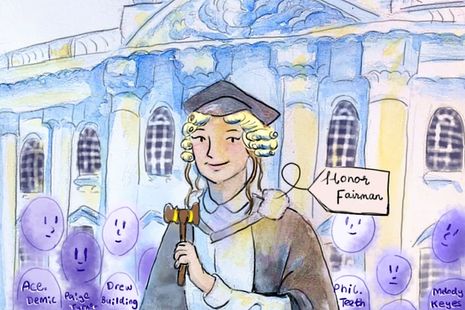Meet the Cambridge students whose names live up to their degree
Thea Grant explores nominative determinism by talking to students about how their names might subtly shape their choices, identities, and even career paths

“So, why did your parents name you Delphi?” My interviewee pauses to think for a moment and, far from the answer I am expecting, replies: “I think it came from a kid in an episode of Supernanny.” And yet Delphi, a second year at Downing, is a Classics student; her name etymologically links back to a city in Greece, well known for its mythological oracle. She explains that while she chose to study Classics because she enjoys the subject and languages, she felt at home in Classics because her name matched.
This idea, that people are drawn to professions or areas of interest that align with their names, is known as ‘nominative determinism’, a term coined by C. R. Cavonius for New Scientist magazine in the 1990s. In the first of what came to be a decades-long recurring column about the phenomenon, the magazine unearthed an author who wrote a book on polar explorations by the name of Daniel Snowman, followed later on by columns on pig researcher Alex Hogg, British urologists A.J. Splatt and D. Weedon, and so on. A quick Google search will reveal many more such examples and, here’s the kicker: this phenomenon is more common among Cambridge students than you would think.
“This idea, that people are drawn to professions or areas of interest that align with their names, is known as ‘nominative determinism’”
Delphi, myself, and Iphigenie, whose namesake is the daughter of Agamemnon in Greek mythology, make up 3 of 81 in our Classics cohort with names that match the subject. Asked whether she had felt that same “at-home” feeling as Delphi in Classics, Iphigenie replied, “with Iphigenie, it’s not always in the nicest of contexts […] but it’s like in a maths lesson when someone’s name is used in a problem, and people say oh, it’s you! It actually happened to me for the first time in a Greek class,” (Iphigenie’s namesake is a high-profile sacrifice in Classical mythology). Both Delphi and Iphigenie also report not coming from particularly Classics-oriented backgrounds, having picked up the related subjects at school of their own prerogative.
Noticing this trend of name-subject links, I began to wonder: are there any other Cambridge students out there who have experienced this bizarre connection to their degree?
“This phenomenon is more common among Cambridge students than you would think”
Oliver Heritage, an incoming first-year History and Politics student at Fitzwilliam College, recalls how he, “liked History beforehand, but I was sitting there the day before subject decisions for GCSE were due and my teacher said I should do history, because surnames used to be linked to occupation.” And so he did; Oliver ended up enjoying History GCSE, and four years later, he is set to start studying it at Cambridge. He emphasises that, whilst his name had an initial impact upon his decision to take History at university, “a lot of different things have pushed me to where I am today, getting on the Foundation Year had nothing to do with my name.” He also reveals that he finds his name to be a great conversation starter, especially “at a place like Cambridge, and there have been times where people have engaged more because of my name.”
Eva Penn, an incoming English student at Murray Edwards, tells me that her, “name, whilst not necessarily being a main factor in my choice of degree, has influenced my identity and the development of my relationship with my degree subject.” She also suggests that the jokes and links that have been made by peers and teachers about her name and aptitude for her subject have “indirectly made me think of my interest in the subject as a more integral part of my identity.” Despite this, Eva’s love for literature came far before anyone pointed out the connection between her name and the subject; she is certain that she would have ended up studying English anyway.
“It’s undeniably a captivating phenomenon of educational identity”
Unlike Eva’s experience, Raphael Justice Gittens-Lunn, an incoming Law student at Girton, is a stronger believer in how nominative determinism has shaped his path to Law at Cambridge. He suggests that, “names can subtly influence the way we see ourselves and the way that others relate to us.” Raphael also tells me that his father’s strong belief in nominative determinism is one of the reasons he was given this middle name. For Raphael: “Justice is a powerful word, and [so] it planted a seed early on.”
Katie Iles is more sceptical about how her name has influenced her degree choice. An incoming Geography student at Newnham, she reflects that, although jokes made in relation to her name and her aptitude for Geography may have reinforced her self-perception as a Geographer, the reason why she is pursuing Geography “is because I had a really good Geography teacher in secondary school whom I clicked with really well, and that gave me a good basis to then become passionate about my subject.” She reflects that she “thought before about whether I would have ended up where I am if I hadn’t had Mr Perry as my teacher, and whether I would be studying something else completely!” Katie also went by a different surname for part of secondary school, reinforcing her belief that her name-subject link is a fun coincidence, and not anything deeper.
Whether coincidence, subconscious influence, or destiny in disguise, nominative determinism captures the imagination. It’s undeniably a captivating phenomenon of educational identity. For Raphael, it has been a guiding force, and for Katie, it is little more than a curious footnote.
 News / Judge Business School advisor resigns over Epstein and Andrew links18 February 2026
News / Judge Business School advisor resigns over Epstein and Andrew links18 February 2026 News / Hundreds of Cambridge academics demand vote on fate of vet course20 February 2026
News / Hundreds of Cambridge academics demand vote on fate of vet course20 February 2026 News / Petition demands University reverse decision on vegan menu20 February 2026
News / Petition demands University reverse decision on vegan menu20 February 2026 News / CUCA members attend Reform rally in London20 February 2026
News / CUCA members attend Reform rally in London20 February 2026 News / Gov grants £36m to Cambridge supercomputer17 February 2026
News / Gov grants £36m to Cambridge supercomputer17 February 2026










